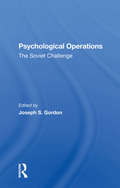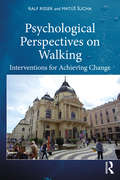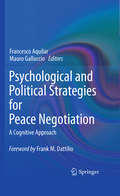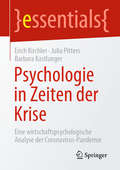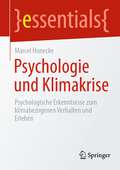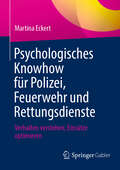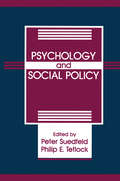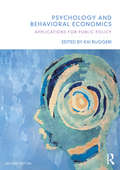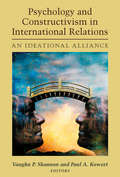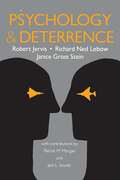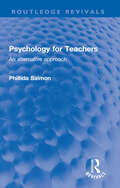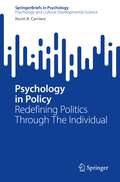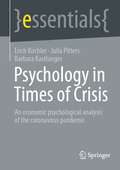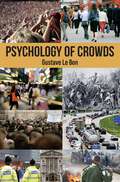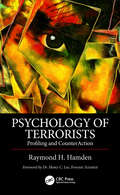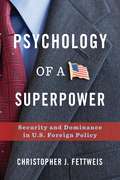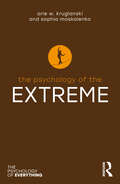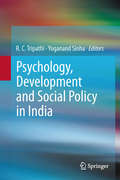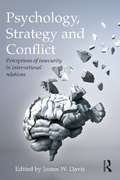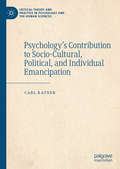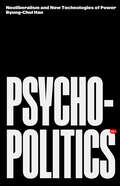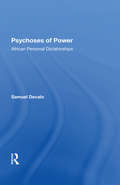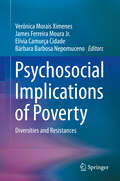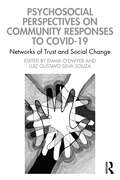- Table View
- List View
Psychological Operations: The Soviet Challenge
by Joseph S GordonThis book evolved from a panel entitled "Psychological Operations: East and West", presented at the annual meeting of the International Studies Association, Section on Military Studies, at the Naval Postgraduate School in the Fall of 1983. The panel focused on the use of propaganda as an instrument of foreign policy by the Soviet Union and its alli
Psychological Perspectives on Walking: Interventions for Achieving Change
by Ralf Risser Matúš ŠuchaPsychological Perspectives on Walking provides a comprehensive overview of the benefits of walking and shows how we can encourage people to walk more based on psychological principles. It examines how walking significantly improves health, positively impacts the environment, contributes to resolving social issues, and boosts the local micro-economy. This pioneering book discusses psychological motivations for walking versus not walking and asserts research-based arguments in favour of walking, including both theoretical considerations and everyday concerns. The book investigates the motivations that can lead to increased walking, advises on how to build walking-conducive habits, and recommends strategies for decision makers for promoting changes that will allow walking to thrive more easily. The authors include success stories and lessons learned from what have become known as 'walkable' cities to show how interventions and initiatives can succeed on a practical basis. This accessible, practical book is essential for urban planners; health specialists; policy makers; traffic experts; psychology, civil engineering, and social sciences students; and experts in the field of sustainable mobility. Psychological Perspectives on Walking will appeal to anyone in the general population in favour of a sustainable and healthy lifestyle.
Psychological Warfare in the Arab-Israeli Conflict
by Ron SchleiferThe first study to examine psychological warfare in the context of the Arab-Israeli conflict, this book presents a rational analysis of the Arab and Israeli struggles to gain the world's sympathy and support, tracing these struggles from the British Mandate to the more recent HAMAS abduction of IDF soldier Gilad Shalit.
Psychological and Political Strategies for Peace Negotiation
by Mauro Galluccio Francesco AquilarPeace is one of the most sought after commodities around the world, and as a result, individuals and countries employ a variety of tactics to obtain it. One of the most common practices used to accomplish peace is negotiation. With its elevated role in the dialogue surrounding peace, negotiation is often steeped in politics and focused on managing parties in conflict. However, the art and science of negotiation can and should be viewed more broadly to include a psychological and cognitive approach. Psychological and Political Strategies for Peace Negotiation gathers the foremost authors in the field and combines their expertise into a volume which addresses the complexity of peace negotiation strategies. To further underscore the importance of successful negotiation strategies, the editors have also included the unique perspective of authors with personal experience with political upheaval in Serbia and Lebanon. Though each chapter focuses on a different topic, they are integrated to create a foundation for future research and practice. Specific topics included in this volume embrace: * Changing minds and the multiple intelligence (MI) framework * Personal schemas in the negotiation process * Escalation of image in international conflicts * Representative decision making * Transformative leadership for peace negotiation Psychological and Political Strategies for Peace Negotiation is an essential reference for psychologists, negotiators, mediators, and conflict managers, as well as for students and researchers in international, cross-cultural and peace psychology studies.
Psychologie in Zeiten der Krise: Eine wirtschaftspsychologische Analyse der Coronavirus-Pandemie (essentials)
by Erich Kirchler Julia Pitters Barbara KastlungerAls uns das Virus SARS-CoV-2 in Europa erreichte, gerieten wir in Panik. Das Leben wurde auf das Notwendigste heruntergefahren und zaghaft wieder gelockert. Dem Lockdown folgen gewaltige Veränderungen. Die Rückkehr in die bekannte Normalität ist nicht in Sicht. Wie erlebten wir die Bedrohung unserer Gesundheit und die Veränderungen der gewohnten Lebensrituale? Was folgte auf Schock und Angst? Wie gelang es, lang eingeübte Rituale abzulegen und die Herausforderungen anzunehmen? Wie werden wir nach dem Lockdown über die politischen Maßnahmen reden, woran werden wir uns erinnern und was werden wir aus der Krise gelernt haben? Dieses Essential bietet eine wirtschaftspsychologische Analyse über das komplexe Zusammenspiel zwischen Staat, Organisationen und Menschen vom Beginn der Krise bis zur Reparaturphase.
Psychologie und Klimakrise: Psychologische Erkenntnisse zum klimabezogenen Verhalten und Erleben (essentials)
by Marcel HuneckeAuf der Grundlage umweltpsychologischer Erkenntnisse werden Ansatzpunkte und Strategien zur Förderung nachhaltigen Verhaltens benannt. Eine sozial-ökologischen Transformation erfordert jedoch nicht nur die Veränderung von spezifischen Verhaltensweisen, sondern umfassende Veränderungen in den bestehenden Lebensstilen. Der Ansatz der psychischen Ressourcen verfolgt dieses Ziel durch die Berücksichtigung des subjektiven Wohlbefindens als zentrale Motivationsquelle für nachhaltiges Verhalten. Hierbei gilt es auch die durch die Klimakrise verursachten Gefühle der Macht- und Hilflosigkeit zu überwinden, um das individuelle und kollektive Engagement für den Klimaschutz zu stärken.
Psychologisches Knowhow für Polizei, Feuerwehr und Rettungsdienste: Verhalten verstehen, Einsätze optimieren
by Martina EckertDieses Buch zeigt, warum psychologisches Knowhow für Polizei, Feuerwehr und Rettungsdienste wichtig ist und wie es dabei helfen kann, Einsätze besser zu bewältigen. Einsatzkräfte müssen in komplexen Situationen schnelle und sichere Entscheidungen treffen, was ein hohes Maß an psychischer Belastbarkeit und Flexibilität erfordert. Die intensive und oft unvorhersehbare Interaktion mit verschiedenen Personengruppen, in Hierarchien und variierende Anforderungen setzen sowohl eine sehr gute Menschenkenntnis und effektive Kommunikationsstrategien als auch eine gute Kenntnis der eigenen Psyche voraus. Versteht man das eigene Denken, Fühlen und Handeln, lassen sich daraus Optimierungsstrategien für den beruflichen Alltag erarbeiten. Gerade in Stresssituationen hilft psychologisches Knowhow dabei, schnell wieder in ein inneres Gleichgewicht zu kommen. Die Autorin bietet vielfältige Einblicke in psychologische Prozesse und Mechanismen. Sie klärt u. a. über die zentrale Bedeutung von Emotionen auf, beleuchtet Steuerungsprozesse bei der (unbewussten) Entscheidungsfindung, zeigt, wie man den Selbstwert stabil hält, die eigene Motivation aufrechterhält, und wie die eigene Wahrnehmung geschärft werden kann, um die Intentionen und Verhaltensweisen von Menschen besser zu erfassen. Neben psychologischem Grundlagenwissen liefert das Buch Anregungen und Tipps, wie sich psychologisches Knowhow in der Praxis von Einsatzkräften nutzen lässt. Ziel ist es, Einsätze zu optimieren und die Selbstregulation zu unterstützen. Die skizzierten Zusammenhänge lassen sich problemlos auf weitere Berufsfelder, z.B. im Ordnungs-, Sozial- und Gesundheitsbereich übertragen.
Psychology And Social Policy
by Philip E. Tetlock Peter SuedfeldThis work explores the application of psychological data and theories to controversial policy issues such as racial and gender inequality, violence and criminal justice. The book also asks whether psychology really has relevant expertise to contribute. First published in 1992. Routledge is an imprint of Taylor & Francis, an informa company.
Psychology and Behavioral Economics: Applications for Public Policy
by Kai RuggeriPsychology and Behavioral Economics offers an expert introduction to how psychology can be applied to a range of public policy areas. It examines the impact of psychological research for public policymaking in economic, financial, and consumer sectors; in education, healthcare, and the workplace; for energy and the environment; and in communications. Your energy bills show you how much you use compared to the average household in your area. Your doctor sends you a text message reminder when your appointment is coming up. Your bank gives you three choices for how much to pay off on your credit card each month. Wherever you look, there has been a rapid increase in the importance we place on understanding real human behaviors in everyday decisions, and these behavioral insights are now regularly used to influence everything from how companies recruit employees through to large-scale public policy and government regulation. But what is the actual evidence behind these tactics, and how did psychology become such a major player in economics? Answering these questions and more, this team of authors, working across both academia and government, present this fully revised and updated reworking of Behavioral Insights for Public Policy. This update covers everything from how policy was historically developed, to major research in human behavior and social psychology, to key moments that brought behavioral sciences to the forefront of public policy. Featuring over 100 empirical examples of how behavioral insights are being used to address some of the most critical challenges faced globally, the book covers key topics such as evidence-based policy, a brief history of behavioral and decision sciences, behavioral economics, and policy evaluation, all illustrated throughout with lively case studies. Including end-of-chapter questions, a glossary, and key concept boxes to aid retention, as well as a new chapter revealing the work of the Canadian government’s behavioral insights unit, this is the perfect textbook for students of psychology, economics, public health, education, and organizational sciences, as well as public policy professionals looking for fresh insight into the underlying theory and practical applications in a range of public policy areas.
Psychology and Constructivism in International Relations: An Ideational Alliance
by Vaughn P. Shannon Paul Kowert"The conversation between political psychology and constructivism is essential and long overdue. By exploring the interaction of individual cognition and social processes, this 'ideational alliance' more fully explains how ideas work all the way down to shape world politics. " ---Theo Farrell, King's College London. "This is a worthwhile and engaging volume. Political psychology is gaining ground as an essential perspective to consider when analyzing international relations, and the book's focus on constructivism provides key insights into the relationship between identity, norms, and behavior---bedrock concepts in understanding the social underpinnings of global politics. " ---Mira Sucharov, Carleton University "An indispensable guide to understanding what distinguishes and what unites psychology and constructivism. A wonderful resource for political psychologists, constructivists, and their critics. " ---Jonathan Mercer, University of Washington Constructivist IR scholars study the ways in which international norms, culture, and identities---all intersubjective phenomena---inform foreign policy and affect the reaction to and outcomes of international events. Political psychologists similarly investigate divergent national self-conceptions as well as the individual cognitive and emotional propensities that shape ideology and policy. Given their mutual interest in human subjectivity and identity politics, a dialogue and synthesis between constructivism and political psychology is long overdue. The contributors to this volume discuss both theoretical and empirical issues of complementarity and critique, with an emphasis on the potential for integrating the viewpoints within a progressive ideational paradigm. Moreover, they make a self-conscious effort to interrogate, rather than gloss over, their differences in the hope that such disagreements will prove particularly rich sources of analytical and empirical insight. Jacket illustration © Ocean Photography/Veer
Psychology and Deterrence (Perspectives on Security)
by Robert Jervis Richard Ned Lebow Janice Gross SteinDetterence is the most basic concept in American foreign policy today. But past practice indicates it often fails to work - and may increase the risk of war. Psychology and Deterrence reveals this stratgy's hidden and generally simplistic assumptions about the nature of power and aggression, threat and response, and calculation and behavior in the international arena.Most current analysis, the authors, note, ignore decisionmakers' emotions, preceptions, and domestic political needs, assuming instead that people repond to crisis in highly rational ways. Examining the historical evidence from a psychological perspective, Psychology and Deterrence offers case studies on the origins of World War I, the 1973 Arab-Israeli conflict, and the Falklands Wars as seen by the most important participants.These case studies reveal national leaders to be both more cautious and more reckless than theory would predict. They also show how deterrence strategies often backfire by aggravating a nation's sense of insequrity, thereby calling forth the very behavior they seek to prevent. The authors' conclusions offer important insights for superpower bargaining and nuclear deterrence.
Psychology for Teachers: An alternative approach (Routledge Revivals)
by Phillida SalmonFirst published in 1988, Psychology for Teachers offers a new approach to the study of the psychology of education. In contrast to many traditional texts, in which measurement is overemphasized and the individual tends to disappear in generalizations, this accessible book stresses the importance of both the individual and the process of learning and considers all aspects of schooling from the viewpoint of the person- whether teacher or pupil. Phillida Salmon provides a profile of the learning classroom through detailed case studies and examples. Her thesis will find an immediate response with all those who work in education. Psychology for Teachers offers both to those in training and in the classroom, and to those who work with them, a new and helpful way of engaging with the challenge of education and invites them to consider from a fresh viewpoint, some critical issues in schooling.
Psychology in Policy: Redefining Politics Through The Individual (SpringerBriefs in Psychology)
by Kevin R. CarriereThis book takes an insider perspective of the psychological issues of creating policy. Instead of considering what the products of policy are - often the case in psychological and political science work - this book examines the individual processes present in proposing and engaging with policy. The individual who engages with the policy and its meanings, the individual who resists the policy through conformity, and the individual who writes the policy for their own ideological purposes are all political actors in a psychological system. This book puts forward a cultural political psychology as the psychological study of the process of values, policy, and power dynamics. Through exploring public policy through private policy generation and individual interaction, this book pushes theoretical understandings of policy and activism in new ways. Centering on an individual’s own values in facing various policy restrictions from governments, parents, or peers, the importance of examining collective actions and also collective inactions of individuals is noted and expanded on in the text. The book provides applications of its arguments through examining the processes of unionization and actualized democracy. It seeks to point out new research avenues, including the hypogeneralization of values, one’s exclusion through activism, and everyday revolutions. This book addresses the centrality of the individual and meaning-making systems when considering where policy, politics, and psychology intersect. This book is primarily addressed to psychologists and political scientists interested in how to make change in public policy. While the experiences within the book are United States-centric, the thoughts and theories behind them are meant to be applicable to a wide variety of political systems. As there is currently very little literature on the topic, this book seeks to fill the gap and offer concise information on such an important dimension of cultural and political psychology. It is expected that the book will be of great interest for researchers in these areas, as well as for graduate-level students. In particular, this book will be relevant to researchers and students working on political psychology, public policy, development, community psychology, social representations, semiotics, activism, and social movements, to name a few.
Psychology in Times of Crisis: An economic psychological analysis of the coronavirus pandemic (essentials)
by Erich Kirchler Julia Pitters Barbara KastlungerWhen the SARS-CoV-2 virus reached us in Europe, we panicked. Life was scaled down to the bare essentials and tentatively loosened up again. The lockdown is followed by huge changes. There is no return to familiar normality in sight. How did we experience the threat to our health and the changes to the familiar rituals of life? What followed shock and fear? How did we manage to discard long-rehearsed rituals and accept the challenges? How will we talk about the policies after the lockdown, what will we remember and what will we have learned from the crisis? This Essential offers an economic psychological analysis of the complex interplay between state, organisations and people from the beginning of the crisis to the repair phase.
Psychology of Crowds
by Gustave Le BonIn this clear and vivid book, Gustave Le Bon throws light on the unconscious irrational workings of group thought and mass emotion as he places crowd ideology in opposition to free-thinking and independent minded individuals. He also shows how the behaviour of an individual changes when she/he is part of a crowd.Le Bon was an eminent psychologist and sociologist. The ideas le Bon explores in this book are extremely relevant to today's society and were of pivotal importance in the early years of group psychology: Sigmund Freud's Massenpsychologie und Ich-Analyse (1921); (English translation Group Psychology and the Analysis of the Ego, 1922) was based on Le Bon's work. Applications include financial market behaviour and political delusions.The original of this work, La Psychologie des Foules, was first translated anonymously into English possibly by a group of French students. Sparkling Books has corrected errors and anomalies in the original translation by reference to the Alcan edition. We have shortened a few passages but maintained the original footnotes and have added some footnotes of our own. Contents>Book One - The Mind of Crowds General characteristics of crowds and the psychological law of their mental unity The sentiments and morality of crowds The ideas, reasoning power, and imagination of crowds The religious nature of crowd convictions Book Two - The Opinions and Beliefs of Crowds Indirect factors of the opinions and beliefs of crowds Direct factors of the opinions of crowds The leaders of crowds and their means of persuasion Fixed beliefs and changeable opinions of crowds Book Three - The Classification and Description of the Different Kinds of Crowds The classification of crowds Crowds committing crimes Criminal juries Electoral assemblies
Psychology of Terrorists: Profiling and CounterAction
by Raymond H. HamdenThe Psychology of Terrorists examines the personality profile of the individual and categorizes the psychology of terrorists into four distinct profiles which are outlined and analyzed in detail. There are many books that cover social psychology and political violence and aggression, but few establish the mind-set of the terrorist as an individual. This includes taking into account personal experiences, and religious or political ideology for the purposes of understanding conceptual and tactical objectives and profiling terrorists to counter terrorist threats. <P><P>Dr. Raymond Hamden presents a unique look at terrorists as individuals with personal motives as well as those of principle. The book presents an analysis of terrorists without prejudice or bias for any political, religious, nationality, creed, or race. Too many times the world see experts focus on issues that are based on their own predispositions or partialities. Although there is criticism on the reliability of profiling, this research demonstrates validity and reliability. It is vital to understand terrorist motivations and this can only be achieved by "knowing" the terrorists' psychological character, looking at the individual terrorist, taking into account particular experiences, psychological makeup, background, and fundamentalist ideology. <P><P>The Psychology of Terrorists: Profiling and CounterAction will be a welcomed addition to psychologists, terrorism researchers, criminal profilers, investigators and intelligence professionals, counter- and anti-terrorism experts, as well as military, security, and law enforcement professionals tasked with protecting individuals from the various acts of terrorism, domestically and globally.
Psychology of a Superpower: Security and Dominance in U.S. Foreign Policy
by Christopher FettweisWith the collapse of the Soviet Union, the United States was left as the world’s sole superpower, which was the dawn of an international order known as unipolarity. The ramifications of imbalanced power extend around the globe—including the country at the center. What has the sudden realization that it stands alone atop the international hierarchy done to the United States? In Psychology of a Superpower, Christopher J. Fettweis examines how unipolarity affects the way U.S. leaders conceive of their role, make strategy, and perceive America’s place in the world.Combining security, strategy, and psychology, Fettweis investigates how the idea of being number one affects the decision making of America’s foreign-policy elite. He examines the role the United States plays in providing global common goods, such as peace and security; the effect of the Cold War’s end on nuclear-weapon strategy and policy; the psychological consequences of unbalanced power; and the grand strategies that have emerged in unipolarity. Drawing on psychology’s insights into the psychological and behavioral consequences of unchecked power, Fettweis brings new insight to political science’s policy-analysis toolkit. He also considers the prospect of the end of unipolarity, offering a challenge to widely held perceptions of American indispensability and asking whether the unipolar moment is worth trying to save. Psychology of a Superpower is a provocative rethinking of the risks and opportunities of the global position of the United States, with significant consequences for U.S. strategy, character, and identity.
Psychology of the Extreme (The Psychology of Everything)
by Arie W. Kruglanski Sophia MoskalenkoWhat does extremism mean? How does it show up in our daily lives? What drives people to extreme behaviors, and how can we learn to live and thrive in the age of overdrive?The Psychology of the Extreme provides an accessible introduction to extremism as a force that can affect all aspects of culture and people’s choices in everyday settings. It explores the underlying psychology behind what makes people act in extreme ways, whether this is in destructive ways (such as gambling, terrorism and political violence) or in constructive ways (such as successful creators and scientists). The book features an array of case studies that show how extremism can be both pro-social and anti-social and includes interventions to reduce extremism or redirect them toward more positive and constructive tendencies. Offering a new understanding of the individual psychology of extremism, the book will appeal to all those interested in how extremism plays out in people’s and cultures' day-to-day lives.
Psychology, Development and Social Policy in India
by R. C. Tripathi Yoganand SinhaThis book examines how and where psychology can engage itself in the framing of social policies for national as well as human development in India. Although the role that psychological knowledge can play in informing social policy decisions has been discussed for a long time, psychologists by and large have had little role in framing policy decisions related to such important domains as education, health, social justice and social inclusion. Policy makers, not only in India, but more or less everywhere have focused on interventions at the macro level, which has led them to ignore the root causes of the problems lying at the micro level. However, with the more humanistic approaches now being followed by economists and other social scientists, the person in society is slowly taking centrestage. Micro-level variables like happiness, the wellbeing of individuals and the social relationships within which people define themselves are becoming important. Therefore, this book discusses important psychological issues related to human development; particularly, health and education, social justice, social integration, environment and work organizations, besides focusing on some general issues relating to the logic of making social policies. It is a first-ever attempt in India to inform policy makers about how micro-variables can be a crucial factor to consider while framing social policies.
Psychology, Strategy and Conflict: Perceptions of Insecurity in International Relations (Routledge Global Security Studies)
by James W. DavisThis volume examines the explanatory nesting approach in the analysis of international relations and its continuing relevance in the 21st century. International relations theory urgently needs strategies for coping with the growing complexity of the international system following the collapse of the US–Soviet bipolar stalemate, the multiple challenges to US unipolar hegemony, and the rise of powerful non-Western actors. Over the course of this book, leading scholars of international relations and diplomatic history return to an approach to explanation pioneered in the writings of Robert Jervis. The approach calls for nesting multiple layers of explanation--systemic, strategic, and perceptual--in an integrated causal account that is simultaneously parsimonious and nuanced. Highlighting the logic of strategic interactions under uncertainty, it also integrates the effects of psychological biases and the unintended consequences of acting in complex systems to provide explanations that are at once theoretically rigorous and rich in empirical detail. Analyzing the current state of Realist theory, signaling under conditions of uncertainty and anarchy, the role of nuclear weapons in international politics, the role of cognition and emotions in economic and foreign policy decision making, and questions of responsibility in international affairs, the authors provide a compelling guide for the future of international relations theory. This book will be of much interest to students of international relations, foreign policy, and security studies.
Psychology’s Contribution to Socio-Cultural, Political, and Individual Emancipation (Critical Theory and Practice in Psychology and the Human Sciences)
by Carl RatnerThis book articulates how psychologists can use their theory, research, and intervention to generate insights into emancipatory social change that is necessary to solve social and psychological problems. These include racism, sexism, civil rights, poverty, militarism, education, and politics. Psychology was not developed to directly address social issues. It must therefore be reconceptualised to fulfil this aim. In this book Carl Ratner makes use of Vygotsky’s psychological approach known as ‘cultural-historical psychology’, supplemented by Martin-Baro’s Liberation Psychology and the work of Bourdieu and Foucault to develop an emancipatory psychological theory. This approach is then utilized to lay out a specific program of social and psychological emancipation. This reconstructed psychological theory is also used to evaluate populist movements that aim at social and psychological emancipation. Ratner posits that populism is inadequate to solve social and psychological problems because it misunderstands the nature of society and what it takes to improve society and psychology. This is demonstrated through wide-ranging examples including populist feminism, populist socialism, and populist distortions of liberation psychology and cultural-historical psychology.This lively critique opens a pathway for academic across the social sciences concerned with how their disciplines can be oriented toward understanding and solving social-psychological problems, and will appeal to wide readership including policy makers, and social activists.
Psychopolitics: Neoliberalism and New Technologies of Power (Futures)
by Byung-Chul HanExploring how neoliberalism has discovered the productive force of the psycheByung-Chul Han, a star of German philosophy, continues his passionate critique of neoliberalism, trenchantly describing a regime of technological domination that, in contrast to Foucault&’s biopower, has discovered the productive force of the psyche. In the course of discussing all the facets of neoliberal psychopolitics fueling our contemporary crisis of freedom, Han elaborates an analytical framework that provides an original theory of Big Data and a lucid phenomenology of emotion. But this provocative essay proposes counter models too, presenting a wealth of ideas and surprising alternatives at every turn.
Psychoses Of Power: African Personal Dictatorships (African Studies Ser. #Vol. 3)
by Samuel DecaloThis book is about the idiosyncratic personal dictatorships sprang up in Africa in the 1960s and 1970s. It surveys the social, economic, and political histories of Uganda, Central African Republic and Equatorial Guinea, exploring conditions that facilitated the rise of the dictatorial triumvirate.
Psychosocial Implications of Poverty: Diversities and Resistances
by Verônica Morais Ximenes James Ferreira Moura Jr. Elívia Camurça Cidade Bárbara Barbosa NepomucenoThis book presents a multidimensional, psychosocial and critical understanding of poverty by bringing together studies carried out with groups in different contexts and situations of deprivation in Brazil, Mexico, Paraguay, Nicaragua and Spain. The book is divided in two parts. The first part presents studies that unveil the psychosocial implications of poverty by revealing the processes of domination based on the stigmatization and criminalization of poor people, which contribute to maintain realities of social inequality. The second part presents studies focused on strategies to fight poverty and forms of resistance developed by individuals who are in situations of marginalization.The studies presented in this contributed volume depart from the theoretical framework developed by Critical Social Psychology, Community Psychology and Liberation Psychology, in an effort to understand poverty beyond its monetary dimension, bringing social, cultural, structural and subjective factors into the analysis. Psychological science in general has not produced specific knowledge about poverty as a result of the relations of domination produced by social inequalities fostered by the capitalist system. This book seeks to fill this gap by presenting a psychosocial perspective with psychological and sociological bases aligned in a dialectical way in order to understand and confront poverty. Psychosocial Implications of Poverty – Diversities and Resistances will be of interest to social psychologists, sociologists and economists interested in multidimensional studies of poverty, as well as to policy makers and activists directly working with the development of policies and strategies to fight poverty.
Psychosocial Perspectives on Community Responses to Covid-19: Networks of Trust and Social Change
by Emma O’Dwyer Souza, Luiz Gustavo SilvaThis highly topical edited book documents the community response to Covid-19 across national contexts, exploring the widespread development and mobilisation of community initiatives and groups. It provides rich analysis of case studies from the Global North and South, including South Africa, the USA, India, China, Mexico, Brazil, Italy, Australia, the UK, Turkey, and Argentina. The Covid-19 pandemic motivated a significant community response globally, with the widespread development and mobilisation of "bottom up" community initiatives and groups. These community responses were an essential yet often unseen and unrecognised means by which people survived the pandemic. This book asks questions such as how were community responses to Covid-19 shaped by national, cultural and political processes and phenomena; how did community responses to Covid-19 interact with public policies, on health, education, and social welfare; and what are the likely political implications of the community response to Covid-19? Discussing the provision of abortion care in Latin America, the support to marginalized communities in Kolkata, and the mobilisation of carnival "krewes" in New Orleans, to give a few examples, the text adopts and develops a novel socio-cultural psychological approach, weaving together contributions from scholars working in diverse disciplinary fields. The text highlights the importance of integrating multiple levels of analysis, including psychological, sociological, and political/ideological, to investigate how communities respond to crises such as the Covid-19 pandemic, and how they can plan for and manage future crises. This is essential reading for academics and students in psychology and the social sciences, as well as policy-makers, charities, and third-sector organisations.
